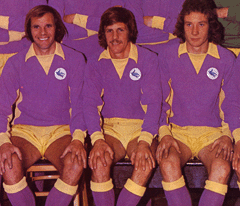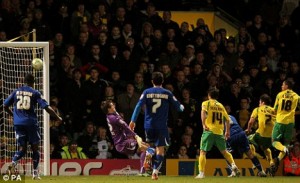 Some people will tell you that the Cardiff City team of 2007/08’s outstanding achievement was to reach the FA Cup Final – don’t believe them, winning at Norwich is the reason why that side should be remembered! Being serious, that’s not quite how I see things, but I say it to try and emphasise how absolutely awful our record at Carrow Road is (we’d lost eighteen out of twenty three matches there before this season). That’s one of the reasons why, despite the very late equaliser, I rate yesterday’s result as a good one for City – in our last two league games we have played sides who, collectively had lost just one game in twenty three before we played them and we ended up with four points. Next week we face a team who have won their last seven league games, if we can pick up three points against them then we will have had an outstanding trio of results which would repair a large chunk of the damage done in November and December.
Some people will tell you that the Cardiff City team of 2007/08’s outstanding achievement was to reach the FA Cup Final – don’t believe them, winning at Norwich is the reason why that side should be remembered! Being serious, that’s not quite how I see things, but I say it to try and emphasise how absolutely awful our record at Carrow Road is (we’d lost eighteen out of twenty three matches there before this season). That’s one of the reasons why, despite the very late equaliser, I rate yesterday’s result as a good one for City – in our last two league games we have played sides who, collectively had lost just one game in twenty three before we played them and we ended up with four points. Next week we face a team who have won their last seven league games, if we can pick up three points against them then we will have had an outstanding trio of results which would repair a large chunk of the damage done in November and December.
City started very well yesterday, for the fourth time in their last five matches they scored an early goal and what a goal it was. Jon Parkin announced his arrival at Cardiff with an outstanding first time effort from twenty five yards after he had flicked on a long kick from Tom Heaton to the impressive Michael Chopra who stood the ball up for our new signing to blast in. Straight after the goal, the pictures went to a shot of Dave Jones and that is what I had to look at for the next ten minutes or so as the Internet link I was using to watch the game froze and I desperately downloaded a program which would enable me to view the game elsewhere.
When I eventually got the picture back, it became obvious after about twenty seconds or so that the whole tenor of the game had changed. Whereas City had been able to move the ball from back to middle to front with controlled passing, now they were inviting pressure by surrendering possession in their own half or knocking hurried long balls which, inevitably were being won back by Norwich – Norwich were doing to City what they did for much of the first half in the game at Cardiff City Stadium in that they were “pressing” the game and closing us down quickly whenever we had possession.
In doing this, Norwich were repeating what I thought was the most impressive part of Swansea’s game when they won at Cardiff City Stadium – their hard work when not in possession of the ball meant that we very rarely had controlled possession of it either. Similarly, I can remember Jason Perry saying after our heavy defeat at Watford that they had been the most effective side he had seen against City this season in hunting down our players when they had the ball and so we were never really able to impose ourselves on the game.
Although I didn’t see the Watford match, the thing that struck me in yesterday’s game, the one with Swansea and the periods of the game with Norwich in Cardiff which they dominated was how poor we were at getting the ball back after having lost it compared to our opponents. Whereas our midfielders and, to a lesser extent, defenders were getting virtually no time on the ball, Norwich’s players in the middle of the park were too often allowed a chance to take in what was happening for a second or two before an opponent closed them down and, at this standard, that second or two is all players need.
I had not heard of the term “pressing” in relation to football until around twenty years ago when Arrigo Sacchi’s AC Milan combined attacking flair and defensive solidity with a desire to win the ball back as quickly and as high up the pitch as possible after they had lost it – this was pretty revolutionary stuff back then because sides had previously been content to keep their shape and let the opposition have the ball in areas of the pitch where it was considered they couldn’t be hurt. In the Champions League Final of 1994 Milan gave a superb lesson as to how effective the pressing game can be when they swept Barcelona away by 4-0. During that period, Champions League Finals tended to be stolid, defensive affairs decided by a penalty shoot out, but this was champagne stuff from a great team – they were 4-0 up in under an hour and the rest of the game became an exhibition.
Ironically, the best exponents of the pressing game around at the moment for me are the team Milan slaughtered seventeen years ago – I reckon Barcelona are the best team in the world both in terms of what they do when they have the ball and what they do when they don’t and, with that in mind, I would like to indulge in a theory which may be a superb piece of analysis on my part or a load of total crap (I’m pretty sure I know which way Dave Jones would vote!).
Sep Guardiola was in the Barcelona team which was humbled in 1994 and I wonder how much his current thinking on the game is influenced by what he experienced that night? Judging by the way his side plays, I would have thought that it must have made an impression on him, but, taking it further than that, how much did that game, and the football Milan played in the years before it, have on the generation of young managers who are now making an impact in the Championship? Paul Lambert, Brendan Rogers and Malky Mackay were all of an age where their footballing principles were being formed back in 1994 and the emphasis their sides seem to place on pressing the ball suggests that their thinking was influenced by Sacchi’s Milan team (Brendan Rogers in particular talks a lot about how his team have played when the opposition has the ball – he was at it again yesterday).
So, if Barcelona are the template for playing the pressing game, how do Cardiff City compare? Well, making allowances for the lower level we play at, I don’t think we do too bad at all when he we have the ball under controlled possession and in Steve McPhail and Peter Whittingham for example we have two very good technical players who will pick sides apart with their passing given the chance. However, I think we have been pretty ordinary when not in possession for quite a few seasons (the 06/07 side were great at putting the opposition under pressure during their marvellous start to that season) and, certainly in midfield, we are not as effective as many or our opponents in this facet of the game (the two players I have mentioned are hardly natural pressers of the ball).
It seems to me that Dave Jones’ philosophy is to back the talented play makers he has even if this leads to his team being disadvantaged when not in possession. Could he feel this way because being that bit older than the managers I have mentioned, he was not at such an impressionable age when AC Milan were demolishing Barcelona and so pressing the ball does not feature quite as high on his list of priorities as it does with some of his younger rivals?
If this is the case, then I don’t think it would be fair to claim straight out that he has got things wrong because it’s all very well to say bring in people who are better at pressing then but you then have to ask would these new players, for all of their better defending, be able to give us what the likes of McPhail and Whittingham can when we had the ball? It seems to me that so much of football management is something of a gamble and our manager is looking at things in a different way to some of the rivals we have at the top of the table. Perhaps, Dave Jones’ way of thinking will prevail at the end of the season, but, even if yesterday’s perfectly acceptable point continued an improvement which has been evident since the Bristol City debacle, I’m not convinced that it will unless the next fortnight or so sees some quality new arrivals at the Cardiff City Stadium.



